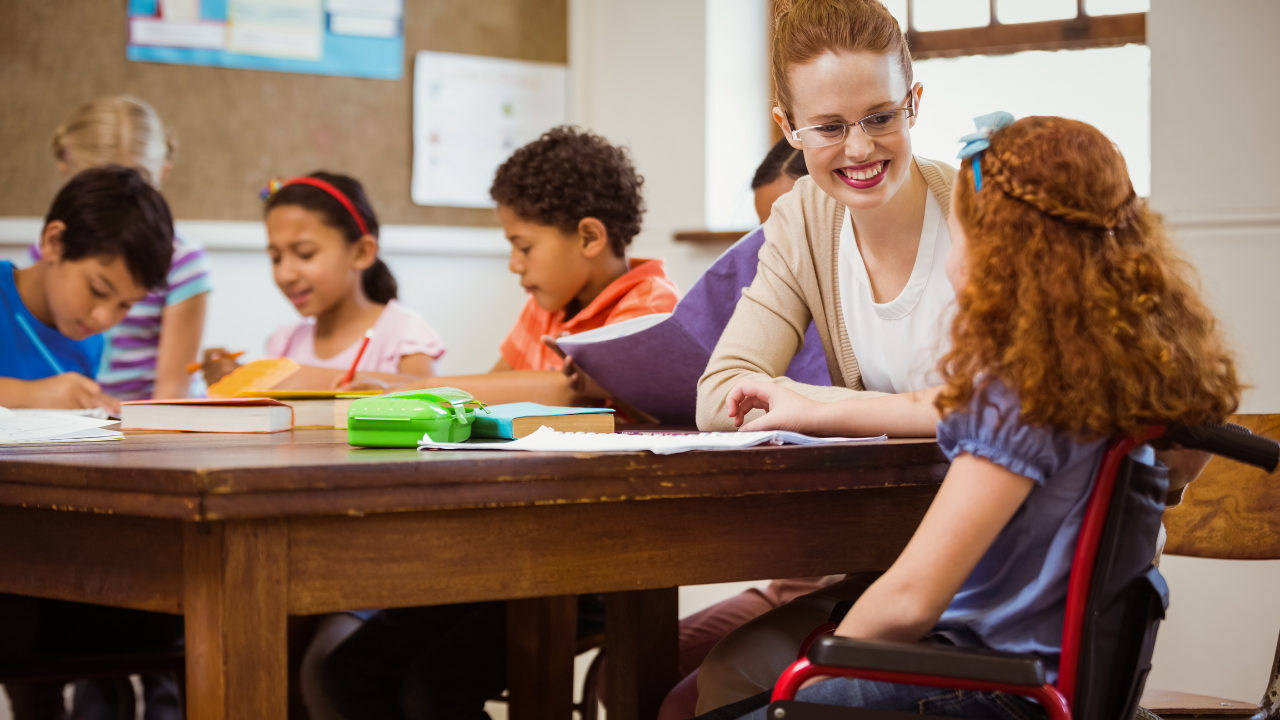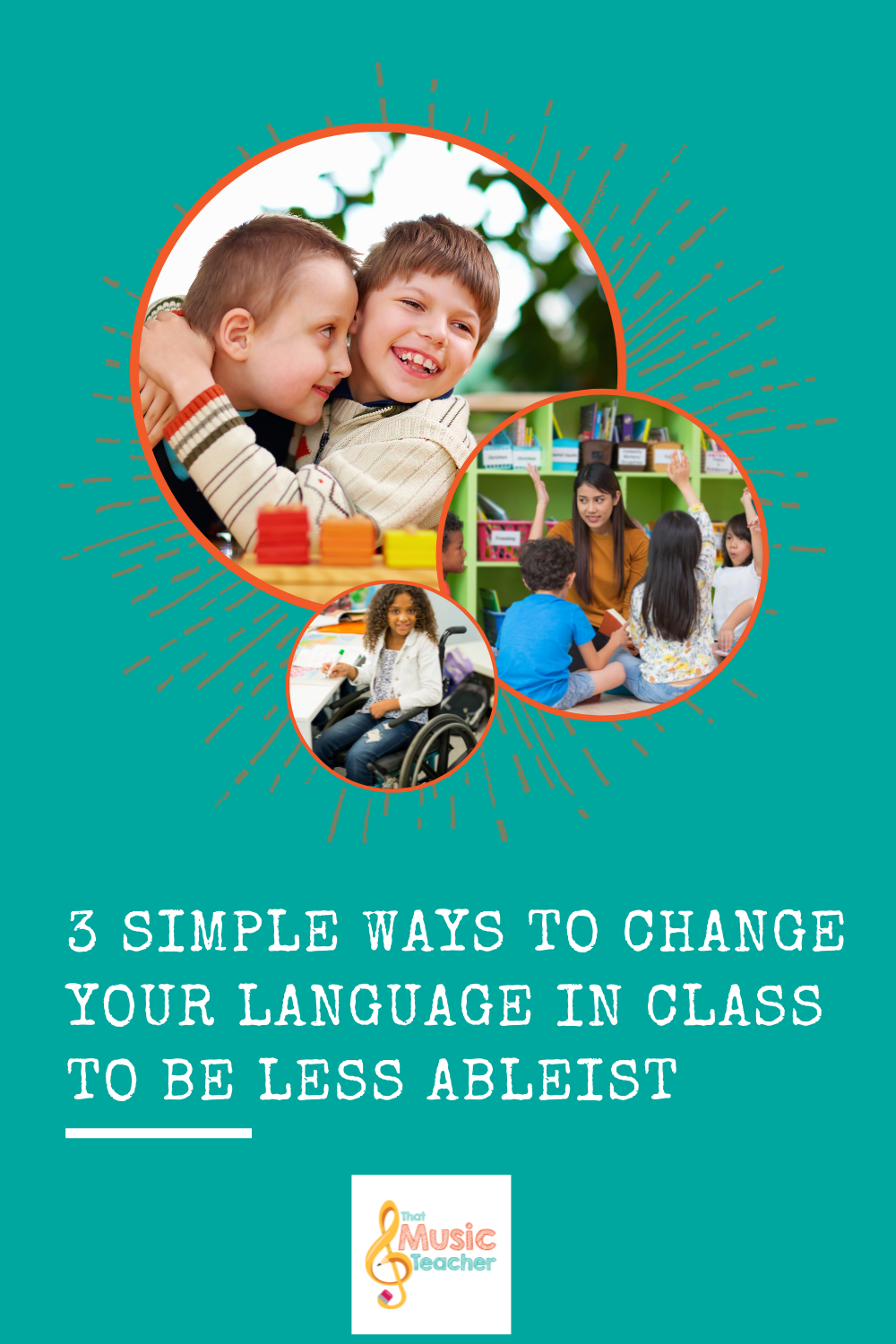
3 Simple Ways To Change Your Language In Class To Be Less Ableist
Nov 23, 2021Language Matters.
Language has so much power. Spoken language. Written. Non-spoken. Body language. It communicates to the world what we want them to know, what we value, and what we know to be true in our lives.
While language is one part of the puzzle in dismantling unjust and unfair systems, it is sometimes disregarded by others. In my (brief) time advocating online, I have met a few individuals who have “either/or” thinking in regards to language. These individuals overlook the value and power of language, and feel that focusing on “changing language,” is not that important; and instead advocate for systemic changes first and foremost. While I agree with these individuals that the bigger issues are the systemic inequities, I disagree with their notion that language “doesn’t matter.”
These individuals have told me, “Language doesn’t matter because language always changes. Change the term and it will change again in 20 years. You need to fix the underlying issues to tackle the language aspect.” I can see an argument for this. However, I strongly feel that both language and inequitable systems can be tackled and should be simultaneously.
It should also be noted that changing language (i.e., taking offensive and dated terms out of our vocabulary) is not a quick fix. Some individuals on the opposite end of the spectrum believe that changing language solves all of the problems. These people think, “Oh, we don’t say “special needs,” anymore? Okay, I will say “disabled.” Great!” They work on changing the language, and then don’t think twice about it again. The issue doesn’t affect them, so they don’t need to bother with it.
But herein lies the issue. Too many of us want to find “quick fixes” to be “correct” in all situations involving race, sexuality, disabilities, and religion. We live in a society that is so fast-paced, so focused on the product and outcome over the process that we don’t have the time to understand why we need to be changing our language. We don’t have a second to think about more than what we need to do to take care of ourselves--to put food on the table and to pay bills.
However, if we can change our language and show individuals why that language is problematic/offensive, it brings us awareness of the underlying systemic issues themselves.
So, how do we start combating ableist language when we see it and hear it in our everyday lives? Here are a few steps to challenging ableist language when we hear it:
Call it out when you hear it
I know it sounds simple, but it does take courage and also some confidence in confronting ableism when we hear it. It can be as simple as addressing a student who says, “That’s crazy! Are you stupid?” or any other comment. As adults, it is important that we don’t only address with this student that it should not be said, but the reason behind why we should not say it. We need to explain why these thoughts are harmful, and that’s where confidence comes in when confronting ableism. Understanding the harmful effects of ableism, and what it looks like, will go a long way in your ability to confront ableism. So, that means we need to listen to disabled voices and learn about ableism and its pervasiveness in our society.
Say WHY it is wrong
It is not enough to say “That’s wrong and we don’t say it.” Our students will only know that they cannot say those phrases around you, not to never say it again.
When explaining why we are changing language, we need to point out that 1) the individuals a part of the community that the word directly affects/is related to wants the word to change, and 2) listening to why they want the term changed. Most likely, they want the term changed for a variety of reasons, and many of them point back to stereotypes or assumptions that this word has come to carry. For example, the term “special” when applied to individuals with disabilities is not considered condescending, infantilizing, and inaccurate. Individuals with disabilities do not have anything “special” about their needs, their needs are just as valid as non-disabled folx.
Speak about disabled people and disabilities so that your students know these are nothing to be ashamed of
Disability is not a bad word. Being disabled is not a bad thing. Due to our societal norms and inequitable systems, able-bodied folx have always had the privilege and power to create and coin verbiage to describe disabled individuals. Even if we able-bodied people are and were well-intentioned, (and I believe many of us have been); we have been undermining and silencing those who have always had a voice all along. The difference is, we were just too caught up in our own self-righteousness to listen. It’s time for us to step aside, swallow our egos, and realize that--despite our schooling, credentials and experience, we will NEVER be disability experts unless we ourselves are disabled. It’s time we listen and put disabled voices at the forefront of our conversations and take ourselves out of the equation when deciding what decisions would be best for disabled folx.
Of course, there will always be individuals who disagree with this sentiment. Someone once told me, “But my son is non-speaking, he cannot have a voice!” and this is where the problem lies. They may not be able to speak, but they certainly have a voice. They certainly have preferences, strengths, likes and dislikes. We need to be able to create the space for this individual, and all individuals with disabilities, to have their voice heard.
This requires a lot of work. This is going to require us to rethink the way we think about disabilities. It will require us to rethink, unlearn, and begin to dismantle the inequitable systems in place. And, it will even mean that we will have to rethink the education system itself.
It will be a lot of work, but to empower everyone around us to feel safe, important, and valued, I am ready to do the work. I hope you are all, too.
If you're ready to do the work check out our other posts on disability or sign up for our Disabilities in the Music Classroom freebie!
This article was submitted by Lauren Marcinkowski contributing author for ThatMusicTeacher.com. Interested in becoming a contributing author? Email resume and writing sample to [email protected]

Don't miss a beat!
New moves, motivation, and classes delivered to your inbox.
We hate SPAM. We will never sell your information, for any reason.

